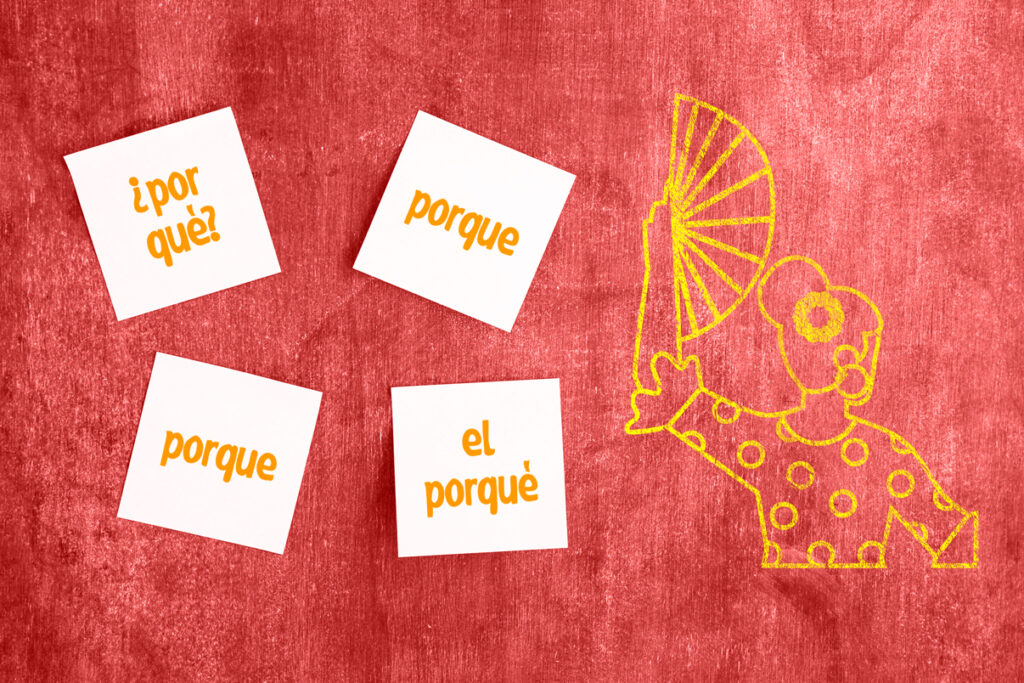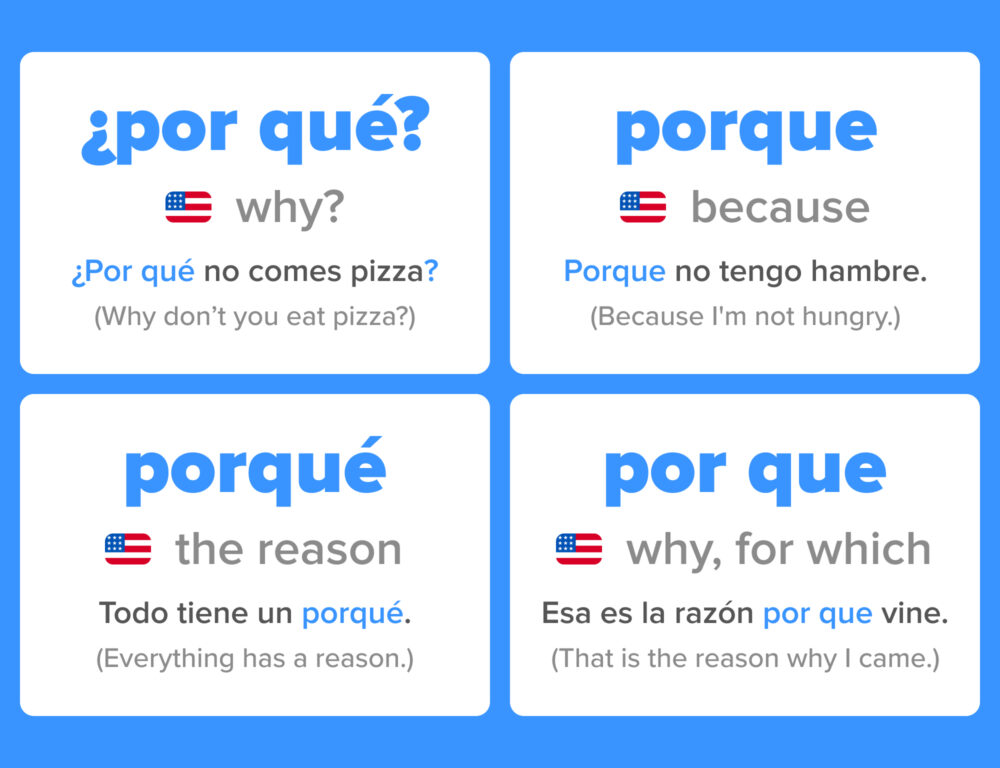
In Spanish, even the slightest thing, like a space or an accent mark, can change the meaning of a sentence completely.
This especially applies to the Spanish por qué.
Don’t believe me? Keep on reading and learn about the four Spanish por qués to find out how!
Contents
Download:
This blog post is available as a convenient and portable PDF that you
can take anywhere.
Click here to get a copy. (Download)

Difference Between Por Qué, Porque, Porqué and Por Que
Having so many variations of what seems to be the same word can be confusing.
But in reality, the way you spell por que (and whether you place an accent or not) changes its meaning.
Let’s take a look at each of these four por ques, their English translations and an example sentence for each.
| Spanish | English | Example |
|---|---|---|
| Por qué | Why | ¿Por qué te gusta bailar? (Why do you like to dance?) |
| Porque | Because | Me gusta bailar porque yo bailo bien. (I like to dance because I dance well.) |
| Porqué | Reason | No necesito un porqué para bailar. (I don’t need a reason to dance.) |
| Por que | Why, for which | Bailo bien. Esa es la razón por que me gusta. (I dance well. That is the reason why/for which I like it.) |
The rest of this post will go into greater detail of each one, but for now, get familiar with their meanings.
It’s also worth noting that there’s a situation where all four por ques tend to be grouped together: in texting!
When texting in Spanish, the por que is often shortened to pk, pq, xk, or xq.
1. ¿Por Qué? — Why?
Por qué is one of the most often used of the four porques. It means “why,” and it’s very easy to use because it works exactly the same as in English.
When you want to ask why, write por qué. Notice that it’s made of two separated words with an accent mark over the e.
Take a look at the following examples:
¿Por qué has venido? (Why have you come?)
¿Por qué no comes pizza? (Why don’t you eat pizza?)
¿Por qué te vas? (Why are you leaving?)
As a question word, it can also be used in indirect questions:
No sé por qué has venido. (I don’t know why you have come.)
Me pregunto por qué no comes pizza. (I wonder why you don’t eat pizza.)
Quiero saber por qué te vas. (I want to know why you are leaving.)
2. Porque — Because
In English, when you ask a question using “why,” you’ll probably obtain a spoken answer beginning with “because.” This is also true of Spanish, but our word for “because” is actually another member of the “porque family.”
1. In Spanish “because” is porque, and it is written as one word without an accent mark. Use this word only when you are giving your reasons:
¿Por qué has venido? Porque tengo tiempo libre. (Why have you come? Because I have some free time.)
¿Por qué no comes pizza? Porque no tengo hambre. (Why don’t you eat pizza? Because I am not hungry.)
¿Por qué te vas? Porque ya es muy tarde. (Why are you leaving? Because it is too late already.)
2. As in English, use porque when reporting events as well:
Me dijo que no vendría porque no tenía tiempo. (He told me he would not come because he didn’t have time.)
Mi hermana me contó que volvió porque se había olvidado la tarjeta de crédito. (My sister told me she came back because she had forgotten her credit card.)
Ella dice que no come porque no tiene hambre. (She says she is not eating because she is not hungry.)
3. Porque is also used very similarly to para que, to explain reasons behind actions. For example:
Te lo dije para que vinieras. (I told you so that you’d come.)
Te lo dije porque vinieras. (I told you so that you’d come.)
Note that por que is also an acceptable spelling for this usage, as you’ll see below.
3. El Porqué — The Reason
This is the noun form of por que. El porqué is normally translated as “the reason,” or less commonly as “why” (used as a noun).
It’s worth noting though that the use of porqué is actually quite rare—archaic, even—so don’t expect to run into it anytime soon.
Porqué can be used with an article, be plural (as in English “whys” and “wherefores”), be modified by adjectives, etc. See this fascinating noun in action:
No entiendo el porqué de tu decisión. (I don’t understand the reason behind your decision.)
Me preguntó los porqués de mi decisión. (He asked about the whys (the reasons/the causes) for my decision.)
Un gran porqué se nos presenta. (A strong reason presents itself.)
4. Por Que — For Which
Por que (two words without an accent mark) is definitely the most difficult and the least commonly used of the four porques.
It can be translated as “for which,” but there are going to be times when you will have to translate it as “why” or even “so that.”
It is present only in two very specific situations, so if you bear in mind the following two rules, you will have no problem with it:
1. Write por que when you have a preposition (por) and a relative pronoun (que).
In these cases, you will be able to translate it as “for which.”
Esa es la razón por que vine. (That is the reason for which I came.)
Este es el motivo por que no llamé. (This is the reason for which I didn’t call.)
2. Write por que when a phrasal verb using por is followed by que.
Examples of Spanish phrasal verbs that use por can be optar por (to opt for, decide), preocuparse por (to worry about, to take care of), luchar por (to fight for), decidirse por (to opt for, decide), etc.
Here are some examples:
Opté por que no vinieras. (I decided that you wouldn’t come.)
Me preocupo por que no te pase nada. (I take care so that nothing happens to you.)
Lucho por que haya paz en el mundo. (I fight so that there is peace in the world.)
Hice lo que pude por que no llegáramos tarde. (I did what I could so that we wouldn’t be late).
Por Qué Practice Quiz
Nothing beats actually trying to choose the correct por qué to actually see if your skills are improving.
Have a look at these sentences to see if they need por qué, porque, porqué or por que, and then check your answers to see if you’re on the right track.
1. ¿________ no te gustan las chihuahuas? (Why don’t you like chihuahuas?)
2. No puedo beber leche ________ soy alérgica. (I can’t drink milk because I’m allergic.)
3. Estoy feliz ________ me voy de vacaciones. (I’m happy because I’m going on vacation.)
4. La razón ________ me encanta ese restaurante es la pizza. (The reason I love this restaurant is the pizza.)
5. El ________ de sus acciones aún no está claro. (The reason behind his actions is still unclear.)
6. ¿________ no vienes a mi casa para la fiesta? (Why aren’t you coming to my house for the party?)
7. ________ tengo que levantarme temprano. (Because I have to wake up early.)
8. La razón ________ tengo que despertarme es para trabajar. (The reason I have to wake up is to work.)
9. OK, entiendo ________ no puedes venir. (OK, I understand why you can’t come.)
10. ¡Pero diviértete, ________ te lo mereces! (But have fun because you deserve it!)
Answers:
- Por qué
- Porque
- Porque
- Por que
- Porqué
- Por qué
- Porque
- Por que
- Por qué
- Porque
As you can see, por qué is quite puzzling and it tends to be wrongly used even by native Spanish speakers!
So don’t worry if you can’t master it at once. Start with the easy ones—por qué and porque—then slowly start practicing the others.
Watching authentic Spanish videos can help to see this kind of grammar used in context. You can find videos on YouTube that are likely to contain these variations.
FluentU also has a collection of videos, and they come with interactive captions that explain vocabulary in context. Through the captions, you can confidently know which por qué is being used and how it functions.
With constant exposure to Spanish, you’ll quickly become familiar with these tricky words and their mannerisms!
Download:
This blog post is available as a convenient and portable PDF that you
can take anywhere.
Click here to get a copy. (Download)



